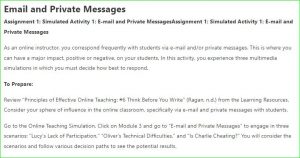Assignment 1: Simulated Activity 1: E-mail and Private Messages
As an online instructor, you correspond frequently with students via e-mail and/or private messages.
This is where you can have a major positive or negative impact on your students. In this activity, you experience three multimedia simulations in which you must decide how best to respond.
To Prepare:
Review “Principles of Effective Online Teaching: #6 Think Before You Write” (Ragan, n.d.) from the Learning Resources. Consider your sphere of influence in the online classroom, specifically via e-mail and private messages with students.
Go to the Online Teaching Simulation. Click on Module 3 and go to “E-mail and Private Messages” to engage in three scenarios: “Lucy’s Lack of Participation,” “Oliver’s Technical Difficulties,” and “Is Charlie Cheating?” You will consider the scenarios and follow various decision paths to see the potential results.

By Day 3 of Week 5
For each scenario, assess the situation and choose a decision path to see the potential outcome. Go back to the beginning of each scenario and follow different paths to see how alternate responses might influence the results.
By Day 7 of Week 5
Submit a 500-word analysis of your interactions with simulated students in this activity. Address the following questions in your analysis:
- Which choices led to better outcomes for each student? Explain why.
- Which choices led to worse outcomes for each student? Explain why.
- What insights did you gain from this activity?
ORDER AN ORIGINAL ASSIGNMENT WITH US TODAY!
Email and Private Messages: Expert Example
Lucy’s Lack of Participation
In this scenario, the Professor speaks to Lucy via private message about her participation in the discussion board. The Professor feels as if Lucy is not engaging fully in this discussion forum, and this is hindering her from earning full points for the participation component of her grade.
Lucy, however, is not aware of what is wrong with her discussion posts and her overall participation on the class discussion board. It is, therefore, the role of the Professor to guide Lucy to better participation on the discussion board so that she can gain more value from her colleagues and the course.
The Professor encourages Lucy to offer more comprehensive feedback and offers to discuss time management strategies to help the student dedicate more time for the discussion board. This is the best possible response (Option A) because it guides Lucy’s behavior as an online learner to success.
Option B is the worst possible choice because it confronts Lucy on her participation but fails to offer a concrete solution on what she needs to do in order to improve. This approach makes the Professor appear to be uncaring and hostile.
From this scenario, I was able to learn that educators have the responsibility of guiding students towards better performance instead of merely reprimanding them for what they fail to do.
Oliver’s Technical Difficulties
In the second scenario, the Professor privately communicates with Oliver, who is experiencing challenges attempting to submit his assignments. Oliver is unable to use the current system, and he keeps blaming the technology, and he is continually asking for help instead of looking for solutions to these challenges.
His inability to learning how to use the software has demotivated him from classwork. The best option in this scenario is Option A. this option encourages Oliver by letting him know that he is on the right track academically and he ought to contact the Distance Learning Department so that he can be guided on how to use this technology.
This approach offers suggestions which promote independent improvement. The worse possible solution is Option C which offers Oliver the choice of sending the assignment to the Professor via email. This approach only provides a short term solution to Oliver’s problem; however, it does not give the online learner room to grow and improve.
This scenario helped me to learn that educators must guide online learners towards self-improvement instead of offering short term solution to challenges.
Is Charlie Cheating?
In the final scenario, the Professor suspects that Charlie cheated on his last examination after submitting a paper that was similar to the one that her sister submitted the previous semester. Once confronted, Charlie gets defensive and the Professor has to deescalate the situation before it gets out of hand. The best choice for this instance is Option A.
this approach offers a solution to the problem as well as inform the students that the teacher is now concerned about his performance. The worse possible choice in this scenario is Option B, where the Professor makes insinuations that Charlie cheated on his last assignment.
This approach is counterproductive as it will only alienate the student from the teacher. From this scenario, I learned that educators should approach cheating suspicion with a firm yet subtle approach. They should look to encourage the student to adopt credibility and integrity while completing school assignments.
References
Module 3: Email and Private Messages. (2019). Retrieved 16 September 2019, from https://mym.cdn.laureate-media.com/2dett4d//Walden/EDDD/8111/CH/mm/sImulated_oline_classroom/module_3b.html
Module 3: Email and Private Messages. (2019). Retrieved 16 September 2019, from https://mym.cdn.laureate-media.com/2dett4d//Walden/EDDD/8111/CH/mm/sImulated_oline_classroom/module_3b.html
Module 3: Email and Private Messages. (2019). Retrieved 16 September 2019, from https://mym.cdn.laureate-media.com/2dett4d//Walden/EDDD/8111/CH/mm/sImulated_oline_classroom/module_3b.html
Also check: Strategies for Facilitating Peer Collaboration in the Online Classroom
